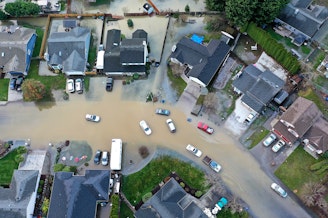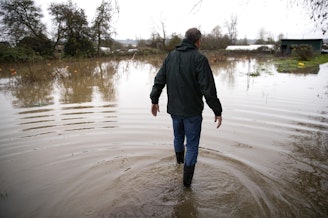How do Washington's dairy cows handle extreme heat?

It is hot this week in Eastern Washington.
How hot is it?
It’s so hot, dairy farmers are scrambling to cool down their herds so that their operations don’t dry up.
Yeah, it’s not a joke.
Northwest News Network's Anna King talked with Jason Sheehan, who runs a big dairy operation east of Sunnyside, Wash. He’s one of the dairy farmers who has been coming up with innovative ways to keep his “girls” cool and comfortable.
"Agriculture is not for the faint of heart," Sheehan told King. "Most of us do this first because we love it, and we enjoy working with the animals. We enjoy working with the people. And so anytime you've got uncomfortable animals or people, you're gonna do everything you can to help make them comfortable."
While Western Washington experienced temperatures in the 90s, places like Sunnyside were seeing temps of 110 degrees on Tuesday and 108 degrees on Wednesday. There is potential for continued triple-digit temperatures as the week progresses.
For dairy farmers like Sheehan, that means uncomfortable cows.
Sponsored
"They can be a little bit stressed in this heat," Sheehan explained. "And that's something that is disheartening for us to see it happen. But that's why I think most dairyman are doing everything they can to keep these cows cool. And this summer has been pretty cool for the most part. So we're hoping this is the only week of really extreme heat."
According to a Washington State Dairy Federation spokesperson, cows can decrease their milk production by 5% to 10% in the extreme heat.
Sheehan has thousands of cows to keep comfortable. In the giant barn that Anna King visited, there were 1,000 mama cows taking advantage of water soakers and fans.
Cows are ruminant animals, meaning they create a lot of heat naturally while their four stomachs work as a chemical processing plant to break everything down. This also means that they prefer chillier temperatures normally.
"You really know if a cow is comfortable and having a good time if they're just kind of laying down in the shade chewing that cud," King explained.
Sponsored
Another way that Sheehan keeps track of the cows' comfort is through what Anna King describes as a "bovine FitBit." They're able to keep track of every moment of a cow's day.
"All the cows in their left ear have a small monitor," Sheehan explained. "And that, just their ear and how much their ear moves, they can tell if a cow is eating, they can tell if she's chewing her cud, they can tell if she's more active than normal, I can tell if she's got lower activity."
The more the activity, the more uncomfortable the cow.
These dairy farmers have also added a little something special to the cows' diet: Watermelon! Adding carrots and watermelons to the feed helps keep it moist, helps keep the cows hydrated, and makes it a little more attractive by sweetening it up.
"We like to call it a salad," Sheehan told Anna King. "And just as in a salad, you also want just enough a little bit of sweet and things like that. So we've got some of the grains and the carrots and watermelon in there right now. And so it makes for a pretty darn good salad when it's hot outside really quite refreshing."
Sponsored

You can listen to the entire conversation with correspondent Anna King in the audio above.






